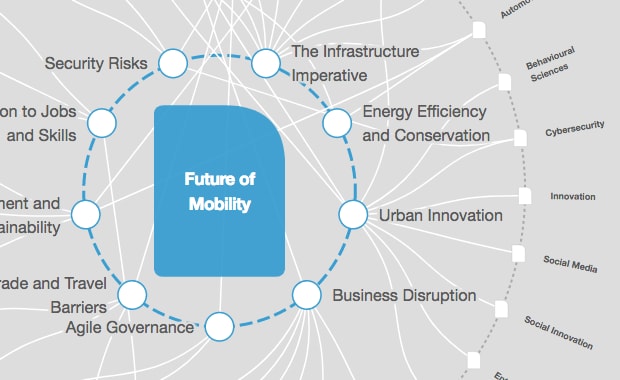Here's why e-mobility must be at the heart of the green recovery

Electrifying urban transport would make a huge dent in our carbon emissions Image: Esa Niemelä from Pixabay

Explore and monitor how Mobility is affecting economies, industries and global issues

Get involved with our crowdsourced digital platform to deliver impact at scale
Stay up to date:
Mobility
- Electric mobility could help curb emissions and create much-needed economic growth.
- Ambitious policies and economic stimuli are needed now to make this a reality.
- This will require cooperation between governments at the local, regional and national levels.
E-mobility remains one of the best solutions for combatting the twin challenges of the economic and climate crises. In Europe alone, e-mobility will create more than 1 million new jobs in vehicle manufacturing, charging infrastructure deployment and supply chains by 2030.
Transport accounts for 23% of global energy-related greenhouse gas (GHG) emissions today and for 34% of the 2050 urban GHG abatement potential. Transport is also a major contributor to air pollution, accounting for around half of current global NOX emissions. Currently available electrification technologies have the potential to eliminate these emissions by 2050. But action is needed.
With steadily growing transport emissions, ambitious policies and economic stimuli are required to reverse this trend and ensure a fast transition to electric vehicles and a roll-out of charging infrastructure to support this process.
The advantages of the technology are clear: air and noise pollution are reduced, while emissions are eliminated . Electrification is the most flexible, energy efficient and sustainable way to decarbonize the economy.
To help curb climate change by reducing emissions, comprehensive and rapid action is needed at both global and regional levels - but cities are a good starting point. The effects of pollution caused by transport are especially high in urban areas, where large numbers of people and vehicles move within a small geographical space and where ports are often situated. More than 80% of people living in urban areas are exposed to air quality levels that exceed World Health Organization limits, a phenomenon caused by using fossil fuel energy both to heat and cool buildings, and to power vehicles. To give an example, London is on the list of top-10 global cities where the chances of dying from transport pollution are high.
Cities occupy just 3% of the Earth’s land, but account for two-thirds of the world's energy demand and 70% of our global GHG emissions. But cities’ high density of facilities and infrastructure also offers a unique opportunity to drive cost-effective technology innovations, and to exploit synergies between sectors to create a highly efficient energy system.

A new report from Navigant shows that electrifying transport in urban areas would be the greatest lever in moving from a business-as-usual climate scenario to a 1.5°C pathway. If all urban areas electrified their private and public transport, they would contribute 28% to the 1.5°C target of the Paris Agreement.
Further, this analysis shows that the greatest emission reductions will come from cars and trucks, which contribute 35–60% and 36–48% of transport emissions respectively. But to get there, a steep uptake of technology is needed. For example, if London is to reach the 1.5°C level, two-thirds of London’s passenger cars and all its buses must be battery electric by 2050 (buses even earlier). This would spare Londoners from 1.7 kilotonnes of annual NOX emissions - the equivalent of 5 billion kilometres driven by diesel vehicles.
Although urban low emission zones are increasingly recognised as one way to curb local air pollution, meeting climate targets will require going further - to zero emission zones - and considerably boosting the uptake of electrified transportation in cities.
Despite this huge potential, cities will not be able to solve these challenges on their own. There is a need for vertical alignment across all levels of government to ensure a clean energy transition – not least in the current context of economic recovery, as decision making, regulation, planning, infrastructure, funding and delivery is often shared across regional, national and local governments. While cities can and do take the lead in many examples, funding and regulatory support and cooperation is required from all levels of government.
Further warming may be unavoidable, but limiting it to 1.5ºC above preindustrial levels would reduce climate change's most dangerous and irreversible effects – and we know that in terms of technology and financing, the 1.5˚C target is feasible.
E-mobility must be at the heart of the green recovery as it will help deliver economic growth, future-proof jobs and the climate targets. Doing the climate math is easy – we know what it takes, but the climate clock is ticking and without global, comprehensive, and near-term action, a 1.5-degree pathway is likely out of reach. Let’s act.
Don't miss any update on this topic
Create a free account and access your personalized content collection with our latest publications and analyses.
License and Republishing
World Economic Forum articles may be republished in accordance with the Creative Commons Attribution-NonCommercial-NoDerivatives 4.0 International Public License, and in accordance with our Terms of Use.
The views expressed in this article are those of the author alone and not the World Economic Forum.
The Agenda Weekly
A weekly update of the most important issues driving the global agenda
You can unsubscribe at any time using the link in our emails. For more details, review our privacy policy.
More on Climate ActionSee all
Ewan Gribbin and Deepanshu Singh
July 26, 2024
Gabi Thesing, Ian Shine and David Elliott
July 25, 2024
Luis Alvarado
July 24, 2024
Kate Whiting
July 23, 2024
Natalie Marchant and Julie Masiga
July 19, 2024





